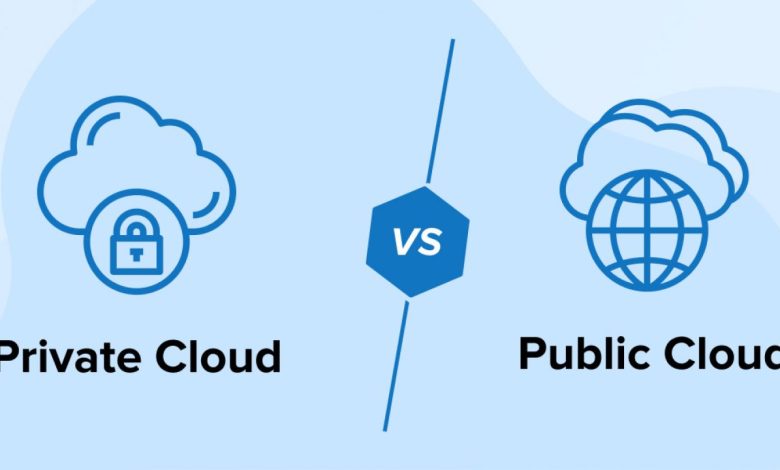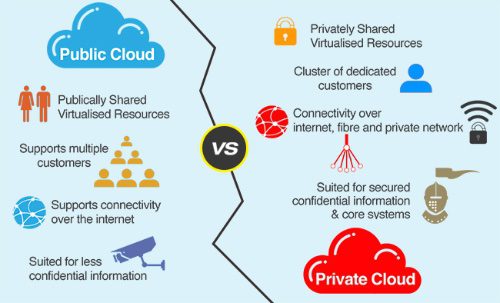Choosing Between Public and Private Cloud

1. What is Public Cloud?
Public cloud services are owned and operated by third-party providers. With this model, resources like servers and storage are delivered over the internet. The provider manages the infrastructure, ensuring uptime, security, and updates. Users share the same infrastructure, but data remains private and isolated.
Popular public cloud providers include Amazon Web Services (AWS), Microsoft Azure, and Google Cloud Platform. These platforms offer a wide range of services, from storage to machine learning tools. Public cloud solutions are usually cost-effective, as users pay only for the resources they use.
2. What is Private Cloud?
Private cloud, on the other hand, is dedicated to a single organization. It can be hosted on-premises or in a data center, and the company itself manages or leases it from a provider. Private cloud infrastructure is not shared with other users, which gives businesses greater control and customization options.
Private clouds can be tailored to meet specific security and performance needs. While this offers enhanced privacy, it often comes with higher costs. Managing a private cloud requires more technical expertise and resources than a public cloud.
3. Advantages of Public Cloud
Public cloud services have become popular for many reasons. Here are some of the key advantages:
- Cost Efficiency: Public clouds operate on a pay-as-you-go model. Businesses avoid large upfront investments, paying only for what they use. This makes public cloud ideal for startups or companies with fluctuating demands.
- Scalability: Public cloud resources are easily scalable. Businesses can increase or decrease resources as needed without investing in physical hardware. This flexibility is beneficial for handling traffic spikes or business growth.
- Accessibility: Public cloud services are accessible from anywhere with an internet connection. This is especially useful for remote teams and global companies that need centralized access to data and applications.
- Innovation and Tools: Major public cloud providers continuously update their offerings. They provide access to the latest technologies, including AI, machine learning, and big data analytics, enabling companies to stay competitive.
4. Advantages of Private Cloud
While public clouds offer flexibility and cost savings, private clouds have distinct benefits:
- Enhanced Security: Private clouds provide a dedicated environment, which minimizes the risk of data breaches. Sensitive industries like healthcare and finance prefer private clouds to meet regulatory compliance and data protection needs.
- Customization: Private cloud infrastructure can be tailored to meet specific requirements. This is useful for companies with unique workloads or high-performance applications that require custom configurations.
- Predictable Costs: Unlike public clouds, private clouds often have fixed costs. For organizations with consistent workloads, private cloud can be more cost-effective in the long term, as it avoids variable expenses associated with fluctuating resource usage.
- Greater Control: Private cloud gives organizations complete control over their infrastructure. This level of control enables them to manage security policies, access levels, and other operational factors more precisely.
5. Key Differences Between Public and Private Clouds
Understanding the differences between public and private clouds is essential for making an informed choice. Here’s a breakdown:
- Cost Structure: Public cloud follows a pay-as-you-go model, while private cloud usually requires a fixed monthly or annual investment. Public cloud is ideal for dynamic workloads, while private cloud suits stable and predictable workloads.
- Security and Compliance: Private cloud offers a dedicated environment, which often makes it easier to comply with regulatory requirements. Public cloud providers implement strong security, but some industries may still require a private setup.
- Control and Management: Public cloud services are fully managed by the provider, meaning companies have limited control over the infrastructure. Private cloud gives organizations complete control, allowing them to customize settings and configurations.
- Scalability and Flexibility: Public cloud is more scalable and flexible, making it ideal for businesses with fluctuating demand. Private cloud can be scaled, but it often requires additional investment in hardware.
6. Factors to Consider When Choosing Between Public and Private Cloud
When choosing between public and private cloud, it’s essential to consider several factors:
- Budget: For businesses with tight budgets, public cloud may be the better choice. Its pay-as-you-go model enables cost savings. However, organizations with stable workloads may find private cloud to be more cost-effective in the long term.
- Data Sensitivity: Companies handling highly sensitive data should consider private cloud. Private cloud infrastructure provides an isolated environment that can meet strict compliance requirements, which is essential for healthcare and financial services.
- Scalability Needs: Businesses expecting rapid growth or fluctuating demand may benefit from public cloud. Its scalability allows for quick adjustments based on demand, without requiring new hardware investments.
- Technical Expertise: Managing a private cloud requires a skilled IT team. Public cloud providers handle the technical aspects, making it a better option for companies with limited IT resources.
- Control Requirements: Organizations that need full control over their infrastructure, applications, and security policies may find private cloud more suitable. Public cloud may offer limited options for customization.
7. Hybrid Cloud: A Third Option
For companies that can’t choose between public and private cloud, hybrid cloud offers a middle ground. Hybrid cloud combines elements of both, enabling organizations to use a mix of public and private resources. For instance, businesses can store sensitive data on a private cloud and use the public cloud for less sensitive applications.
Hybrid cloud provides flexibility and cost savings. However, it requires careful management to ensure seamless integration between the two environments.
8. Real-World Examples
Many organizations have successfully implemented public, private, and hybrid cloud solutions. For example, Netflix uses the public cloud to handle high-demand periods and enhance customer experience. The company leverages the scalability of public cloud to deliver seamless streaming.
Meanwhile, financial institutions often rely on private cloud to secure sensitive data. A private environment ensures that they meet strict regulatory standards and protect customer information.
Some companies adopt hybrid cloud to balance their needs. They use private cloud for data storage and public cloud for testing new applications or scaling resources temporarily.

9. Conclusion
Choosing between public and private cloud depends on your organization’s specific needs. Public cloud offers cost savings, scalability, and ease of use, making it ideal for dynamic businesses. Private cloud, on the other hand, provides enhanced security, customization, and control, making it suitable for regulated industries or stable workloads.
Ultimately, the right choice will align with your budget, security needs, and technical capabilities. Hybrid cloud can also be a viable solution for companies looking for flexibility. By understanding the strengths and limitations of each cloud type, businesses can make informed decisions that support their goals.





